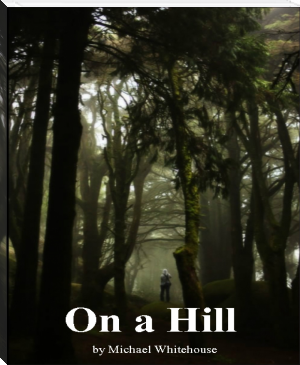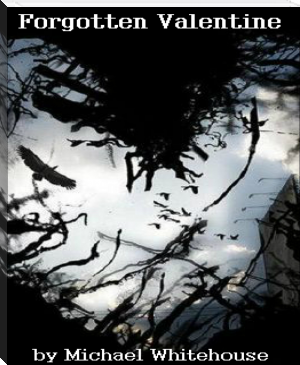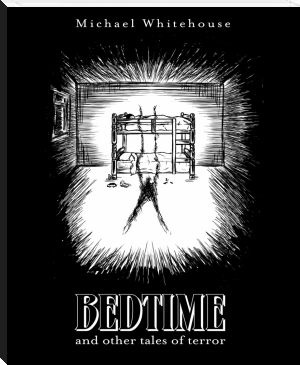On a Hill, Michael Whitehouse [hardest books to read .TXT] 📗

- Author: Michael Whitehouse
Book online «On a Hill, Michael Whitehouse [hardest books to read .TXT] 📗». Author Michael Whitehouse
I
The events of the past several days have both shaken my understanding of the world, and left me with a disheartened and perplexed disposition. Yet I feel that I must organise these events in my mind, that I am compelled to structure the terrible things which I have seen so that I may understand them better, so that my mind may be at rest - a need to quantify just what took place.
It was entirely by accident that I met one John R———. It was Spring, and the early crocuses were faring well against the last frozen constraints of winter’s grip. I was researching an article I was writing for a publication which was, shall we say, less than reputable, when I found myself at the mercy of a small Highland village for the evening.
The whole ordeal was frustrating and tiresome to say the least. I was supposed to be back in Glasgow that night to type up my notes and brush off the fog which often accompanied my writing assignments. Being stranded in a tiny village with one street and a pub inn, which looked like it hadn’t been decorated since the dark ages, was not my idea of home comfort; especially after a few weeks of constant travel, interminable interviewees, and more than one restless night in a dingy bed and breakfast.
There had been a small subsidence one town over which had made it impossible for the local bus to continue onward and, more importantly to me, carry me to safety. Following several phone calls as I attempted to procure alternative travel arrangements, it became apparent that I was going nowhere until morning. The sleepy pub inn which was affectionately entitled The Laird of Dungorth - looking like it could fall down on top of me at any moment, complete as it was with warped wooden rafters and a clientele who appeared just as creaky - would have to be my home for the night.
After speaking to the owner, a tall, peaked man in his fifties, I was kindly given a small room upstairs which clearly hadn’t been slept in - or cleaned - for some time. Still, the people were nice enough and after some basic but enjoyable local food, I sat in a cosy arm chair by an old open fire in the bar, deciding to kill the boredom with a few pints of local beer and a bottle of wine. The flames danced around before me, and as the evening drew in and the numbing of alcohol took effect, I actually was quite content - almost glad to be in such rustic surroundings. The village may have been somewhat bleak, but against the cold winds outside and a darkening sky, the inn was not without charm.
I’m not sure how long he had been sitting there, hypnotised as I was by the heat from under the mantelpiece and a few glasses of red, but it became apparent that I had been joined by another guest at the inn. He sat across from me in a broad and frayed armchair on the other side of the fireplace, sat there gazing at the flickering flames.
He was curious in disposition. Outwardly he appeared to be relatively young - probably in his early thirties - but his persona was swamped in a fragility which one would normally not expect to see in a man of his age. His face glowed in the firelight, carrying with it worry and lines which betrayed an inner turmoil; his eyes defocused, glazed over and his hands trembling slightly as he warmed them by the burning embers.
‘Is there a problem?’ - I heard the words, but did not register them until they were repeated.
‘Excuse me. Is there a problem?’ The man addressed me in a sharp manner, and I was taken aback by the realisation that I had been staring at him for several minutes.
‘No. Not at all,’ I answered apologetically. ‘I… I thought I recognised you.’
As he turned to face me he displayed in his expression a look of disbelief at my obvious lie, but thankfully, not without a small vestige of good humour.
‘I apologise if I was a little abrupt with you,’ he said. ‘It’s just that I am sick and tired of people staring at me around here.’ He raised his voice at the conclusion of his sentence and cast a wide eye around the pub to the few scattered drinkers and lurkers who populated it. I sensed that those present wished to avoid his gaze.
We then diverted into an hour or so of small talk. His name was John R—— and he was a land acquirement agent from London. He claimed to be appraising a location nearby, which a local farmer was willing to sell off to property developers, but I immediately sensed that he was not comfortable talking about his work. In fact, he quickly changed the focus of the conversation on to me entirely; my job, life, family, anything. It was as if he needed our exchanges to continue in an obviously failed attempt to keep his mind distracted from a hidden anxiety. Each time I attempted to ask a question about him or his life, he would either provide one or two word answers, or ignore them altogether, moving quickly into a question of his own.
Finally the conversation ran its course - as they often do with only one real participant - and for a moment we sat in relative silence; the only sounds coming from a few locals propping up the bar and the occasional clink of empty glasses being washed and cleaned by the owner.
The pub was now noticeably dimmer, with most of the light being provided by a few small overhead lights and the fire which continued to crackle and flicker all evening. I turned to one of the windows outside, seeing nothing but darkness. Then the words just escaped from my mouth without a thought, or effort: ‘Why would people be staring at you, John?’
There was a long pause as I looked at him while awaiting an answer, his eyes trained to the floor, but his face etched in worry. I expected no in-depth response given the curtness of his previous conversation, and so continued drinking my wine when he suddenly replied in a somber tone: ‘They all know, but they don’t have the courage to speak about it.’ Turning to the few fellow drinkers still in the pub he then shouted: ‘They’re all afraid!’
The response from the landlord and his patrons was unusually muted. They seemed to ignore John’s accusation entirely, with only the briefest hesitation of movement or conversation proof that they had actually heard the outburst at all. I did not expect such a volatile response, but there was desperation in that shout; anger and frustration. Then, looking directly at me with what I can only describe as a mixture of fear and heartbreak, he opened his mouth as if to speak again, before hesitating once more. I sensed that the man deep down wished to finally relieve himself of a burden, as if some piece of toxic information was boring into his very soul.
As a writer, my curiosity was captivated by the possibility of an enthralling tale, perhaps even one I could use as the basis for a future article or story. Anticipating that he now only required the slightest push to confide in me, I leaned over and whispered ‘What is it?’ filled with conflicting sentiment. I could feel that I was about to become privy to something important, yet by his trembling and anxious demeanour I dreaded what that something might be.
Another moment passed, and it was as if the entire room had fallen under a shadow of palpable silence, those nearby listening from tenebrous and uninviting corners. Then he spoke: ‘If you’d be kind enough to share your wine with me, I’d be glad to tell you,’ he said softly.
He did not have to say twice. I rose out of my chair and asked at the bar for a second bottle and glass to share with my companion. There was a peculiar hesitancy as the landlord picked up both from the shelf behind him, placing them in front of me. As I returned to my seat, I knew those present were now watching me, and I felt in my bones that there was something uncomfortably stifling about their looks; shadowed accusatory glances steeped in fear.
I poured a glass of wine, of which John drank in one glutinous gulp - a sight I knew well as of a man drowning a malignancy which burns inside. After pouring him another, I sat the bottle between us waiting for him to tell his story.
After looking down at his drink for a moment, he raised his head, staring intently at me as the fire crackled and burned, then as if exorcising a burden from his soul, he began.
II
John had initially intended on spending no more than a few days in the village. Even after travelling all day from London, and the evening bringing with it the bite of the Scottish winter, he intended to get started as quickly as possible - the quicker he was finished, the quicker he’d be home.
Working for a large property acquisition firm, it was his job to facilitate rich clients in their pursuit of land on which to build on. The individual he was representing at that time was especially interested in buying some farmland with a beautiful country view, where they wished to build a large holiday home for their family. The location in question had recently been put on the market by a local farmer who had fallen on difficult times as the economy wilted. John was therefore hired to evaluate the land and negotiate a price, based on the recommendations made by a group of surveyors who had been there the previous week.
After checking in to The Laird of Dungorth, he drove his car to the farm which was only a few miles outside of the village. The entire area consisted of large sprawling fields where crops were grown and animals grazed, a few patches of woodland, and the occasional river or bubbling stream. The negotiations were relatively simple, the farmer - an elderly man by the name of Dale - needed an injection of money as soon as possible to keep the rest of the farm on its feet, while the buying client was enthusiastic about the potential purchase and wished to conclude the deal quickly.
Regardless, John was always careful about finalising a deal before he himself had taken a look at the land. Over the years he had developed a reputation for delivering exactly what a client wanted, without any nasty surprises after procurement such as land subsidences or other planning difficulties. Although he didn’t much enjoy the ground work of surveying, he was well qualified to spot anything which might cause difficulties at a later date, but despite this thorough attitude, he still hoped to be back in the city perhaps as soon as the next day, all things being well.
The farmer, Mr Dale, graciously agreed to take him out to the land by tractor, and it was not without a slight feeling of remorse that John listened to the old man describing the history of the area, his family’s attachment to it, and why it was so important for him to keep the place going. But business was business, and the money Dale would make on the two fields in question would provide him with a substantial windfall - hopefully enough to help him weather the financial storm.
Night approached quickly, and John was delighted that the bumpy and uncomfortable drive did not take too long. After a short time Dale stopped





Comments (0)